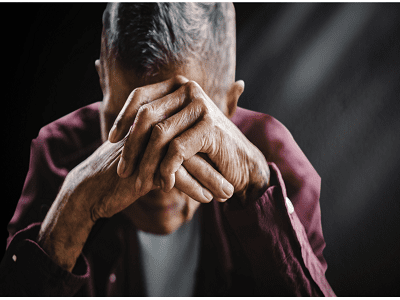The 10 Types of Elder Abuse

Physical and Emotional Abuse
When someone with power over an elderly person intentionally harms them or puts them at risk of harm, their actions — or lack of action — are considered elder abuse. Elder abuse isn’t just one action or inaction and it can take many forms. The 10 types of elder abuse are:
Physical and emotional
- Elder neglect by children/relatives
- Elder neglect by care giver/nursing home
- Self neglect
- Physical abuse
- Sexual abuse
- Abandonment
- Emotional or psychological abuse
- Financial and legal
- Financial abuse
- Cheating elderly by close people
- Legal abuse
All types of elder abuse can lead to devastating consequences, including physical and/or emotional harm and even death. It is key for older people and their loved ones to know about all elder abuse types. They can use this knowledge to prevent abuse from happening or stop it before severe harm occurs also ensure proper elder care. Take action if you or a loved one suffered abuse or neglect in a nursing home or at home .
The types of elder abuse go beyond physical and emotional harm. Elders can suffer from sexual assaults, financial exploitation, abandonment, and more. Most types of elder abuse are committed by trusted individuals, like family or nursing home staff. Elders can sometimes mistreat themselves through self-neglect. According to experts, elders are more likely to self-report financial exploitation than emotional abuse, physical abuse, sexual abuse, or neglect. Psychological abuse is the most common type of elder abuse.
Elder neglect by children/relatives
The single biggest neglect of elderly/senior citizens comes from own children, followed by close relatives like daughter in law or brothers or sisters. The neglect of elderly comes from variety of ways.
- Not offering food at all or not giving tasty food
- Not offering food in time
- Not cleaning room of elderly or washing clothes
- Not permitting socialization with visitors or family members
- Providing badly furnished or ventilated rooms
- Not providing devices to prevent fall in bathrooms/rooms
- Not modifying rooms to suit elderly
- Not providing proper toilet facility/cleaning bed after toilet
- Shouting at them or taunting them
- Leaving alone for long periods etc
Elder neglect by care giver/nursing home
Elder/senior citizens neglect happens when a caregiver fails to protect an older adult from harm, resulting in serious injuries or illnesses. Cases of elder care home and nursing home neglect are not honest accidents. Rather, they are the result of carelessness or a lack of regard for an older person’s health. Signs of elder neglect include:
- Dehydration and/or malnutrition
- Frequent injuries/cuts
- Inadequate or unclean clothing
- Lack of food in the home/long-term care facility
- Lack of needed medical aids
- Poor personal hygiene
- Unclean or unsafe home/long-term care facility
- Unpaid bills
- Untreated infections or injuries
- Weight loss
Neglect can lead to serious health problems, including bed sores sepsis, and even death. Unfortunately, neglect a particularly high risk in assisted living facilities with staffing issues. Elderly fall in elder homes/Nursing homes .Large number of elder care homes or nursing homes are built without taking consideration of physical status of elderly/senior citizens. These buildings and rooms are built by normal engineers/architects without taking inputs from geriatric specialists or Geriatric physiotherapists.
- Will have steps at different points which could become dangerous for elderly
- May not have facility for wheel chair movements
- May have slippery floors
- Bathroom fixtures are not provided to prevent fall
- Beds are not designed for elderly
- May not provide high rise chairs for elderly
These design flaws may not be intentional, but because of ignorance by the owners or planners of elder care facility.
Elder self-neglect
Self-neglect happens when an elderly/senior person is no longer able to meet their basic daily needs, and they suffer as a result. An older person may be suffering from self-neglect if they can’t:
- Drink or feed themselves without help
- Dress themselves
- Maintain basic hygiene
- Maintain their home
- Manage financial affairs
- Properly address their medical needs
Many older adults struggle with letting go of their independence or acknowledging that they may not be able to care for themselves. However, if an older person has caregivers or lives in a nursing home, then self-neglect should not be occurring. In these cases, a caregiver may be committing neglect.
Elder abandonment
Sometimes paired with neglect, elder abandonment happens when someone who cares for an older person intentionally deserts them.The former caretaker may leave the elder/senior at a hospital, nursing home, for another care facility without any formal arrangement, or with relatives who did not agree to be caregivers. Someone may be the victim of elder abandonment if they are alone and:
- Appear confused, lost, or scared
- Have poor personal hygiene
- Seem frail, malnourished, or dehydrated
- Regardless of the situation, elder abandonment can lead to a great deal of confusion and pain — and
- put their physical health at risk.
Physical elder abuse
It is the intentional use of force against an elderly person. It includes hitting, shoving, kicking, or physically restraining an older adult. Signs of physical elder abuse include:
- Cuts or scrapes
- Broken bones
- Bruises
- Burns
- Dislocated joints
- Head injuries
- Sprains
There are also signs beyond the injuries themselves that could mean an older person has suffered from physical abuse. These signs include:
- A pattern of hospitalization for the same or similar injuries
- Delayed medical care for an injury
- Poor explanations for the elder’s injury from care providers
- Trips to different emergency rooms (to possibly avoid suspicion)
If an older person you love has been injured, make sure to ask caregivers how the injury happened and if it’s being treated promptly. Any uncertainty could mean that the injury stems from physical abuse.
Sexual elder abuse
Elder sexual abuse is the forced or non-consensual sexual contact of any kind which is not uncommon. This includes sexual interactions with elders with dementia, Alzheimer’s, or other cognitive disabilities that prevent them from giving consent. Warning signs of elder sexual abuse include:
- Bleeding from the anus or genitals
- Bruised genitals or inner thighs
- New sexually transmitted diseases or infections (STDs/STIs)
- Pain in the anus or genitals
- Pelvic injuries
- Problems walking or sitting
Elders can be sexually abused by anyone, including nursing home staff, residents, in-home caretakers, friends, and family members.
Emotional elder abuse
Psychological and emotional abuse are intentional acts that inflict mental pain, fear, or distress on an elder. Emotional abuse can take many forms. For example, caregivers may be-little elders, call them names, or threaten them. But it’s not just name-calling – caregivers may even cut off older people from loved ones or resources. Signs of emotional and psychological abuse in elders include:
- Appearing depressed, withdrawn, or scared
- Avoiding eye contact
- Different eating or sleeping patterns
- Isolation from friends and family
- Low self-esteem
- Mood swings
- Sudden changes in behavior/personality
Emotional and psychological changes can often go hand-in-hand with other types of elder abuse, such as physical harm or neglect. This means it’s key to check on your loved one’s overall health if you notice signs of emotional abuse.
Financial elder abuse
Elder financial abuse is the illegal, unauthorized, or improper use of an older individual’s resources. Nursing home staff, family, or even strangers can all commit elder financial abuse. Warning signs of elder financial abuse include:
- A pattern of missing belongings or property
- An elderly person who does not know or understand their own financial situation
- Canceled checks or bank statements that go to someone other than the elder
- Changes to an older person’s power of attorney or bank accounts
- Eviction notices
- Evidence of unpaid bills
- Someone showing unusual interest in how much money an elder is spending
- Bank withdrawals the elder could not have made including debit card use.
- Purchase of luxury items etc
Cheating by Children or relatives
As physical strength and mental abilities age ,many devious people try to cheat elderly. These cheatings or deception are done by close relatives like children or relatives. These can be carried out by others too. For many , the only interest that they have in elderly is their wealth. Few such instances are given below:
- Cancelling previous will or making a new will to divert property.
- Creating account transfer which divert pensions
- Selling off or pawning jewelry
- Making Agreement to sell assets or sell assets abruptly
- Making Power of Attorney[POA] to favor someone.
- Use of Bank accounts to divert funds
- Use of debit cards for personal purchases
- Wrong or misleading accounting
Many elderly suffer from dementia or have poor mental caliber. As they are physically weak, they can be deceived in to signing documents without clear understanding.
Legal elder abuse
This is the type of elder abuse in which elderly are subjected to series of prolonged court cases. The abuser could file court cases in different courts with financial or other claims. The courts will take up such cases and fix repeated “dates” for hearing. The elderly spend huge amount of money for lawyers and spend days together in courts, almost completely destroying their peaceful old age. At some point of time, the elderly get tired of the cases and stop attending courts altogether as cases prolong decades together. They end up losing cases which result in loss of assets. Entire Govt, Police and Judiciary are party to this abuse as there are no laws to attend to urgent hearings of the elderly.
It is almost a “state sponsored” elder abuse.
If you suspect elder abuse or need assistance:
Elder abuse can be committed by anyone: friends, family, care staff, or strangers. Because of this, it’s important to keep a close eye on your loved one’s well-being and take action if you think any type of elder abuse is occurring.
Call 100[Police] in an emergency: If you are worried that an elder is in immediate danger, call the police.
Other helpful Nos: State wise helpline no:14567 [operational in few states],1800-180-1253 [Help age India] +91-97442858613 [SIMON’S Elder care support devices )
Check in with your loved one: Some elders may be hesitant or scared to bring up their abuse experience, but they may confide in you with gentle prompting.Keep in regular contact with your loved one: Elders who are socially isolated are at a higher risk of abuse. Keep in regular contact with your loved one: Elders who are socially isolated are at a higher risk of abuse. Take accusations seriously: Too many people neglect to believe elders when they tell loved ones about their abuse. Do not take elder abuse accusations lightly — make sure you get your older loved one the help they need.
Message for all children
Please get yourself educated about eldercare.
Never forget your responsibility and accountability




